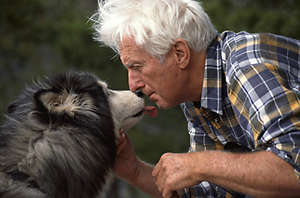
 |
|
 Following are sample questions and answers about the health and well being of your pets. This information is provided as an aid to you and is not intended to replace a visit to your vet. Be sure to check back on this page later for a new slate of information. My pet has been misbehaving lately. What could be causing this? Sometimes a change in behavior could indicate a medical condition. For instance, a cat that suddenly begins to urinate outside the litter box might have a urinary tract infection. Likewise, a well-trained dog that suddenly begins to urinate in the house may also be experiencing a urinary tract infection. In both cases, the pets should be checked by your veterinarian. If physical ailments are not the source of your pet's bad behavior, your vet may be able to recommend appropriate training techniques, devices or even medications to help correct the abnormal behavior. Sometimes a change in the home environment, such as a new type of cat litter or a new location of the litter box, is the answer. In some instances, referral to a professional trainer or veterinary behavior specialist might be appropriate. Why are some pet foods more expensive than others? There may be a difference in the quality of the ingredients used in making the foods. While some brands use high quality sources of protein and carbohydrates, less expensive brands may use lower quality protein sources and fillers. These highly digestible and tasty foods may cost more per bag, but they provide superior nutrition, less waste and a comparable cost per serving, Superior nutrition may result in fewer health problems for your pet. I'm thinking of getting a ferret. What special considerations are there? Ferrets are members of the weasel family and can make interesting and educational pets, but they need to be taken care of differently than dogs and cats. They are mischievous creatures and will often steal and hide objects, dig up plants and burrow in sofa cushions if not supervised. Make sure your ferret has all its proper vaccinations and yearly boosters. Female ferrets are at a risk of death unless they are spayed and males will be much nicer if neutered and de-musked. Do cats' teeth need to be cleaned? Yes. Feline dentistry is one special area of need. Each feline dental problem is unique and requires certain procedures to control infection or tooth loss. Feline cavities (endodontic, osteoclastic resorptive lesions) are a significant problem in cats' mouths and must be handled appropriately when diagnosed. Can cats get heartworms? Yes, cats are susceptible to heartworm disease, though much less frequently than dogs. There is now prevention available in a new, accurate screening test. Before this test was available, there was no way to accurately determine the prevalence of this disease. What are four things I should know about cats? Tylenol (acetaminophen) and ibuprofen can be fatal to a cat. What humans see on a bright moon-lit night is equal to what cats see in total darkness. Healthy cats, unlike dogs, have starved themselves to death in the presence of food. And facial rubbing, scratching walls and furniture are normal marking behaviors. Can hairballs be dangerous? Cats spend up to 1/3 of their waking hours cleaning and grooming themselves. During grooming, tiny barbs on you cat's tongue pull loose hairs from the coat and are swallowed. Hair is not dissolved by the cat's digestive system, and can accumulate in the stomach and the intestine, interfering with normal digestion and elimination. Hairballs can cause chronic vomiting, constipation, lethargy, and/or loss of appetite. Daily brushing of your cat's fur to remove loose hair is good preventive practice. In addition to grooming, medications can be used to help eliminate hairballs and prevent their reoccurrence. What is a proper nutritional diet for my iguana? All plant material should be washed, chopped, mixed, and served at room temperature or slightly warmer. For hatchlings up to 14 inches in length, feed twice a day or continuous availability with plant matter finely chopped or shredded. They need 85% plant material, 15% animal protein sources. For juveniles up to 2.5 years or 3 feet in length, feed once a day, plant matter chopped fine to medium or shredded, 90% plant material, 10% animal protein sources. For adults over 2.5 years or 3 feet in length, feed every two days, plant matter coarsely chopped, 95% plant material, 5% animal protein sources. What could be the problem if my guinea pig is depressed, thin and not eating? The most common cause of anorexia (lack of eating) coupled with a wet chin in a guinea pig is overgrown molars. This condition should be treated by your veterinarian. |
|
|